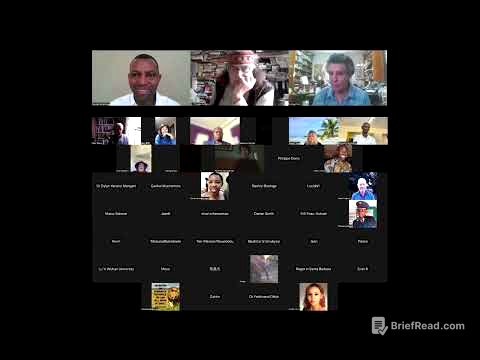TLDR;
This video provides guidance on finding remote job opportunities, particularly for Africans, and stresses the importance of having relevant skills and experience. It highlights various platforms and strategies for securing remote work, including building a portfolio, networking on social media, and volunteering to gain experience.
- Prioritise gaining relevant skills and experience, even through pro bono work or hypothetical projects.
- Utilise online platforms like Hiring Cafe, Wellfound, Working Nomads, and Remotive, and filter searches with relevant keywords.
- Engage in Facebook groups and LinkedIn communities to network and find opportunities, while respecting group rules and showcasing your value.
Introduction: The Importance of Qualifications and Experience [0:00]
The video begins by emphasising that qualifications and relevant experience are crucial for securing remote jobs. Many people struggle to find remote work because they lack specific experience or familiarity with the tools and systems used in remote roles. Traditional job experience doesn't always translate directly to remote work, so it's important to acquire the necessary skills.
Gaining Experience and Building a Portfolio [0:00]
To gain an edge in the remote job market, it's recommended to learn the relevant tools and systems, often through online resources like YouTube videos. Creating a hypothetical portfolio showcasing your skills for international brands can be effective, especially in visual fields like graphic design or video editing. Content writers should maintain a blog or Substack to demonstrate their abilities. Pro bono work is another excellent way to gain experience and build a portfolio to attract hiring managers.
Remote Job Platforms [0:02]
Several remote job platforms are highlighted, including Hiring Cafe, Wellfound, Working Nomads, and Remotive. Some of these platforms may require payment, but there are also free options available. When searching for jobs, use keywords like "remote," "anywhere," and "EMEA region" (Europe, Middle East, and Africa) to filter results effectively.
Leveraging Facebook Groups for Opportunities [0:03]
Facebook groups can be a valuable resource for finding remote work. Groups like "Women Helping Women Entrepreneurs," Clickfunnels, and the digtal nomads community often have job postings. When participating in these groups, it's essential to respect the rules, avoid direct messaging, and focus on sharing your value in a professional manner. Posting samples of your work and offering pro bono services can attract potential clients.
LinkedIn and Volunteer Sites [0:04]
LinkedIn is another platform with a large community of remote workers. Additionally, volunteer sites like We Make Change and Volunteer Match offer opportunities to gain experience, particularly in the non-profit sector. When signing up for Volunteer Match, register as an individual rather than an organisation.
Targeting Remote-First Companies [0:05]
Look for companies that are "remote-first," meaning they primarily hire and operate remotely, without being tied to a physical office. Companies like Deal, On the Go Systems, and Remote are examples of such organisations that frequently post remote job openings.
Final Advice: Communicating Your Value [0:05]
The video concludes by reiterating the importance of communicating your value effectively, respecting group rules, and continuously working on your portfolio and gaining experience. Sharing the video with Africans seeking remote work is encouraged, as remote work is seen as a significant opportunity for the continent's future.









